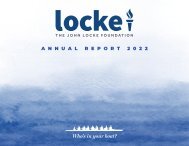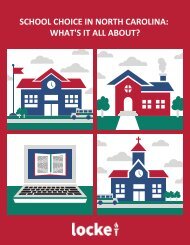Keeping the Peace Through Intensive Community Policing
As crime soars and the breakdown of public order takes its toll on our country, analysis from the John Locke Foundation signals it’s time to adopt a different approach to crime control, one that shifts the focus further upstream, looking at prevention models, rather than exclusively on punitive measures. In this July 2021 report, John Locke Foundation researcher and author Jon Guze explains that the current focus of catching, convicting, and punishing perpetrators after crimes have been committed has come with enormous economic and social costs. However, intensive community policing has proven successful at deterring crime and maintaining order, which leads to safer communities and fewer people living in poverty. Guze recommends a four-pronged plan to move forward with community policing: (1) hire more police officers (2) increase the pay for police officers (3) arm police officers with state-of-the-art training, direction, and support (4) deploy police officers as “peacekeepers” in communities that suffer most from crime and disorder.
As crime soars and the breakdown of public order takes its toll on our country, analysis from the John Locke Foundation signals it’s time to adopt a different approach to crime control, one that shifts the focus further upstream, looking at prevention models, rather than exclusively on punitive measures. In this July 2021 report, John Locke Foundation researcher and author Jon Guze explains that the current focus of catching, convicting, and punishing perpetrators after crimes have been committed has come with enormous economic and social costs.
However, intensive community policing has proven successful at deterring crime and maintaining order, which leads to safer communities and fewer people living in poverty. Guze recommends a four-pronged plan to move forward with community policing:
(1) hire more police officers
(2) increase the pay for police officers
(3) arm police officers with state-of-the-art training, direction, and support
(4) deploy police officers as “peacekeepers” in communities that suffer most from crime and disorder.
Create successful ePaper yourself
Turn your PDF publications into a flip-book with our unique Google optimized e-Paper software.
Our History<br />
The John Locke Foundation was created in 1990 as an<br />
independent, nonprofit think tank that would work “for<br />
truth, for freedom, for <strong>the</strong> future of North Carolina.” The<br />
Foundation is named for John Locke (1632-1704), an<br />
English philosopher whose writings inspired Thomas<br />
Jefferson and <strong>the</strong> o<strong>the</strong>r Founders. The John Locke Foundation<br />
is a 501(c)(3) research institute and is funded by<br />
thousands of individuals, foundations and corporations.<br />
The Foundation does not accept government funds or<br />
contributions to influence its work or <strong>the</strong> outcomes of<br />
its research.<br />
Our Vision<br />
The John Locke Foundation envisions a North Carolina of<br />
responsible citizens, strong families, and successful communities<br />
committed to individual liberty and limited,<br />
constitutional government.<br />
Our Mission<br />
The John Locke Foundation employs research, journalism,<br />
and outreach programs to transform government through<br />
competition, innovation, personal freedom, and personal<br />
responsibility. Locke seeks a better balance between <strong>the</strong><br />
public sector and private institutions of family, faith, community,<br />
and enterprise.











